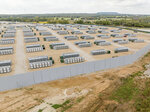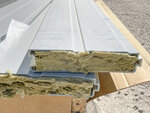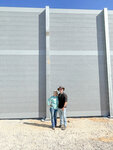


For the past year, the constant fan noise emanating from the Bitcoin mining corporation located near the Wolf Hollow data center in Granbury has led to many Hood County residents becoming disgruntled with the new center.
But now, residents can finally sleep better at night following the completion of a 24-foot high and almost 2,000-foot-long soundproofing wall that was recently constructed around the center.
Bitcoin is a cryptocurrency — a virtual currency designed to act as money and a form of payment outside the control of any one person, group or entity, thus removing the need for third-party involvement in financial transactions, according to investopedia.com.
With Bitcoin essentially being the currency of the internet, rather than being controlled by a bank, the currency is controlled by mathematics and software.
However, with banks out of the equation, Bitcoin will need some agency to keep track of the funds, and that is where bitcoin mining comes into play.
Bitcoin mining refers to the process where a global network of computers running the Bitcoin code work to ensure transactions are legitimate and added correctly to the cryptocurrency’s blockchain. Mining is also how new Bitcoin is entered into circulation, according to forbes.com.
With Bitcoin mining basically being the accountants of the internet, Granbury's massive 300-megawatt Bitcoin mining data center runs its accounting software on supercomputers using a very specific chip.
Matt Prusak, chief commercial officer for US Bitcoin, explained that Granbury’s Bitcoin mining site — known as the delta — is “one of the largest in North America,” using between 70,000 to 90,000 supercomputers at its location.
"We're not the biggest, but we're very proud,” he said. “We don't own it. It's actually owned by a private equity fund, but we're the responsible one. We’re the operators. We've been operating that site now for roughly a year.”
Prusak explained that when US Bitcoin took over the Granbury site, they were brought in by the owner to “keep things in shipshape.”
One of the issues Prusak noted was complaints from residents regarding the loud noise caused by fans to keep the supercomputers cool.
“We were a big believer in being a good citizen, and being a good neighbor was addressing any neighborly concerns," he said. “We're trying to run the software as fast as possible, as best as possible, so we run them hot, and we have fans to cool them down. Now the fans, much like the old desktop computer fans can make some noise, so we commissioned with our partner a large investment in a noise wall.”
Prusak explained he presented the soundproofing wall project at a town hall meeting with Hood County Precinct 2 Commissioner Nannette Samuelson in attendance, where he laid out the “multimillion dollar investment” that US Bitcoin was making on the wall.
“Not long after taking office, I began getting calls and emails from residents complaining about the noise from the Bitcoin data center next to Wolf Hollow power plant,” Samuelson said, in a text message to the HCN. “Constable (John) Shirley and I did some investigation to verify, and then reached out to US Bitcoin to discuss solutions.”
Samuelson said from the first meeting with Prusak, he was “committed to being a good community partner.”
“The company had already made plans to build a noise barrier wall, which he explained during a community town hall I held in June,” she said. “I kept in touch with Mr. Prusak getting updates every few weeks. He was very accommodating when I requested a tour to see the wall firsthand. Once the wall is complete, the residents should see a reduction in noise emitting from the data center.”
Prusak said the wall was just recently completed and that he is pleased to say it’s the “best in class.”
"This thing is awesome,” he said. “It is 24 feet high and almost half a mile long. We had three different crews with over 30 people working to build this wall and I'm pleased to say that it will — and it has — solved the concern.”
The soundproofing wall is metal and contains an acoustic dampening material inside the siding that is used to absorb sound.
“It was a big investment in time and money, but we think it's worthwhile,” Prusak said. “We built the site with the intention that we would stay and keep everyone employed and show that this is best in class and again, this is one of the crown jewels in North America for Bitcoin mining, so part of being that is showing that you care about your neighborhood.”
Prusak added that Commissioner Samuelson was an “awesome partner” in the soundproofing wall project.
“She's been nothing but hospitable in terms of allowing us to participate in the town hall and sort of giving us input from the community on how to be a good neighbor, and I have to thank her for her kind partnership,” he said.
Prusak explained that one Bitcoin is equal to about $35,000 in U.S. dollars, adding that he doesn’t have a specific number on how many Bitcoins the site is able to produce in a day.
“There's a lot of math, so I can't say we make 10 a day or anything like that,” he explained. “I can say that they're worth about $34,000-$35,000, and we've got, you know, tens of thousands of machines running to do that.”
As for the future of Granbury’s delta site, Prusak said with already being the “largest private Bitcoin mine operator in North America,” the focus now is on continuing to develop its place in the industry, build great facilities, and hire locals.
“Our mission is to secure the future of finance; that's the goal,” he added. “At the end of the day, we're proud Bitcoin miners and we're very proud of this wall. We're quite happy with the result and we look forward to continuing to be a good neighbor.”